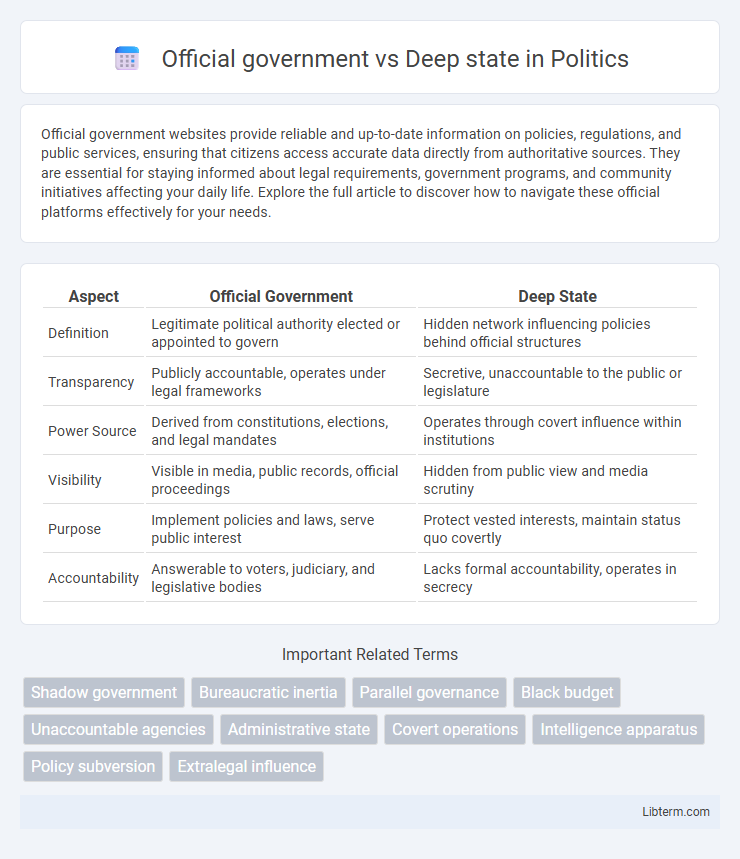Official government websites provide reliable and up-to-date information on policies, regulations, and public services, ensuring that citizens access accurate data directly from authoritative sources. They are essential for staying informed about legal requirements, government programs, and community initiatives affecting your daily life. Explore the full article to discover how to navigate these official platforms effectively for your needs.
Table of Comparison
| Aspect | Official Government | Deep State |
|---|---|---|
| Definition | Legitimate political authority elected or appointed to govern | Hidden network influencing policies behind official structures |
| Transparency | Publicly accountable, operates under legal frameworks | Secretive, unaccountable to the public or legislature |
| Power Source | Derived from constitutions, elections, and legal mandates | Operates through covert influence within institutions |
| Visibility | Visible in media, public records, official proceedings | Hidden from public view and media scrutiny |
| Purpose | Implement policies and laws, serve public interest | Protect vested interests, maintain status quo covertly |
| Accountability | Answerable to voters, judiciary, and legislative bodies | Lacks formal accountability, operates in secrecy |
Defining the Official Government
The official government consists of the elected representatives and appointed officials who hold legal authority to create and enforce laws within a recognized political system. This structure operates transparently through established institutions such as the executive, legislature, and judiciary, embodying the legitimate exercise of state power. Defined by constitutional frameworks and electoral legitimacy, the official government maintains public accountability and adheres to codified rules governing its functions.
What is the Deep State?
The Deep State refers to a network of influential members within government agencies, military, intelligence, and bureaucracies operating independently of elected officials, often with the goal of controlling policy and decision-making behind the scenes. Unlike the official government, which consists of publicly accountable leaders and institutions, the Deep State functions covertly to maintain established power structures and resist political changes. This shadow organization is associated with secrecy, manipulation, and a lack of transparency in governance.
Historical Origins of the Deep State Concept
The term "deep state" traces its origins to mid-20th century Turkey, where it described secret networks within the military and intelligence agencies influencing government policy beyond democratic oversight. Historically, these shadowy entities operated parallel to the official government, maintaining power through covert operations and institutional control often linked to national security interests. Understanding this concept requires examining how clandestine bureaucracies subvert formal political structures, a phenomenon observed in various nations during periods of political instability and state consolidation.
Structure and Roles of Official Government
The official government consists of elected and appointed officials who operate within a transparent legal framework, responsible for creating laws, enforcing policies, and managing public resources. Its structure includes executive, legislative, and judicial branches, each with clearly defined roles to ensure accountability, representation, and checks and balances. Agencies and public institutions support governance by implementing regulations and delivering services aligned with the state's legal mandates and democratic principles.
Alleged Influence of the Deep State
The alleged influence of the deep state involves covert networks within government agencies manipulating policies and decisions beyond official oversight. These actors supposedly operate independently of elected officials, using intelligence services and bureaucratic power to shape domestic and foreign agendas. Critics argue this hidden influence undermines democratic processes and accountability in governance.
Key Differences Between Official Government and Deep State
The official government operates transparently through elected officials and established legal frameworks, while the deep state consists of hidden networks of bureaucrats and intelligence agencies exerting covert influence. Key differences include accountability, as the official government is subject to public oversight and democratic processes, whereas the deep state functions without direct public knowledge or sanction. Moreover, the official government enacts policy openly, whereas the deep state manipulates policy outcomes behind the scenes to maintain power and control.
Case Studies: Deep State Accusations Worldwide
Numerous case studies highlight deep state accusations globally, including Turkey's persistent claims of a clandestine network within the military and bureaucracy undermining elected officials, known as the "Ergenekon" case. In Egypt, the military's influential role behind the scenes post-Arab Spring has sparked debates on the blurred lines between official government control and deep state power. Similarly, Malaysia's investigations into alleged deep state interference have exposed hidden networks operating beyond governmental oversight, impacting policy and political stability.
Government Transparency vs. Deep State Secrecy
Official governments operate under legal frameworks that prioritize transparency, ensuring public access to information and accountability through open records, legislative oversight, and media scrutiny. In contrast, the deep state functions covertly, utilizing secrecy, undisclosed operations, and hidden networks to influence policy without public awareness or consent. This dichotomy creates tension between democratic openness and clandestine control, impacting the balance of power and citizen trust in governmental institutions.
Public Perception and Media Representation
Public perception of the official government is generally shaped by transparency and accountability mechanisms, whereas the deep state is often viewed through conspiracy theories suggesting covert influence and hidden agendas. Media representation frequently amplifies these distinctions, with mainstream outlets focusing on tangible governance while alternative media highlights alleged clandestine operations attributed to the deep state. This dichotomy impacts trust levels and shapes public discourse on political legitimacy and power dynamics.
Implications for Democracy and Rule of Law
The dynamic between official government institutions and the deep state presents significant challenges for democracy and the rule of law by potentially eroding transparency and accountability in governance. When non-elected bureaucratic entities or powerful clandestine networks influence policy decisions behind the scenes, it undermines the electoral mandate and distorts democratic processes. This covert influence risks weakening institutional checks and balances, fostering public distrust, and compromising legal frameworks essential for upholding democratic principles.
Official government Infographic

 libterm.com
libterm.com